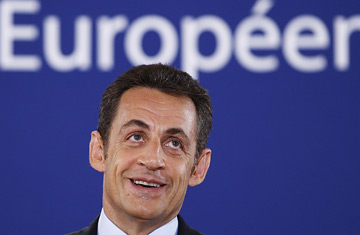
France's President Nicolas Sarkozy
Vaulting ambition helped propel Nicolas Sarkozy to the Elysée Palace, but when it comes to extending his grandiose plans to Europe, the French President risks a noisy clatter to the floor.
France officially took over the six-month presidency of the European Union from Slovenia on Tuesday, and the irrepressible Sarkozy has promised an action-packed program covering issues from immigration and global warming to farm reform and defense. No doubt he also hopes his moment in the E.U. spotlight will put France back in its self-assumed position as Europe's creative motor and political soul.
But last month's Irish "no" vote on the E.U.'s Lisbon Treaty has triggered a rumbling uncertainty over the future of Europe's institutions. Instead of launching ostentatious initiatives, Sarkozy is likely to have his hands filled dealing with the fallout from Ireland. Add to that slowing growth, rising inflation and soaring fuel prices, and Sarkozy's legendary reserves of energy and enthusiasm will be tested to the limit as he tries to clear the climate of angst smothering Europe.
Speaking on French television Monday, Sarkozy admitted that "something isn't right" with the E.U., and there had been "errors" in the way it was set up. He warned that its citizens were losing faith in the project, adding, "We must therefore profoundly change our way of building Europe."
But neither Sarkozy nor anyone else has yet concocted a way out of the mess created by the Irish "no." His task will be all the more complicated after the obstreperous Polish President Lech Kaczynski announced Monday that he would not sign the Treaty, saying the document was pointless after Irish voters rejected it. Sarkozy and other leaders agreed last week to push the treaty forward in the 26 other member states, with an eye to the possibility that Ireland might eventually be compelled to put the question to the people again with more success.
Sarkozy is due to travel to Ireland on July 11 to hear firsthand the concerns of Irish voters, but beyond that there is little he can do until October, when Irish Prime Minister Brian Cowen tells the other E.U. leaders whether a second Lisbon Treaty referendum is possible.
Many officials would like Sarkozy to concentrate instead on issues like shepherding an agreement on an E.U. climate change package that goes beyond the Kyoto Protocol commitments. But he has put more attention on plans for a Europe-wide cut in fuel taxes — already dismissed as useless market interference by most other E.U. leaders — and a hard-line European migration pact, which is also lacks widespread support.
"There are too many issues on the French presidency agenda," said Hugo Brady, of the London-based Centre for European Reform. He warned that instead of overextending himself — and trying to resolve the irresolvable Lisbon Treaty morass — Sarkozy should limit himself to a few key policy issues that the E.U. can rally round.
Brady also warned against Sarkozy's following his presidential predecessors' tradition of nakedly pushing French national interests in Europe's name. "The E.U. presidency is about achieving consensus. It's about being an honest broker, not a bulldozer," Brady said. He warned that Sarkozy's penchant for glitz and spontaneous policy announcements could be jarring in the more cautious E.U. settings. "Sarkozy has admirable energy, but he does not have diplomatic skill," he said. "At a time of fraught nerves, Europe needs someone to reassure, and I'm not sure Sarkozy is that man."
The omens are not good. Sarkozy has already raised hackles by warning the E.U. would not be able to enlarge without the Lisbon Treaty, and by blaming E.U. Trade Commissioner Peter Mandelson for the Irish "no" vote. He has also vowed to defend the E.U.'s controversial agricultural subsidies, threatening to block any deal at the World Trade Organization that jeopardizes Europe's farming industry. And for someone who sets so much on his emollient charm, Sarkozy still has a grating relationship with German Chancellor Angela Merkel, whose support is crucial if any of the French initiatives are to succeed.
The night before France took on the E.U. presidency, the Eiffel Tower was lit up in a sparkling blue with gold stars, representing the E.U. colors. But earlier in the day, French lorry drivers blocked roads around Paris in protest at rising fuel prices. Such real-life intrusions are more likely to define Sarkozy's six months at the E.U.'s tiller than a fancy light show.
